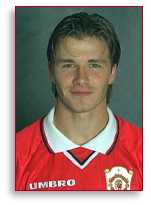

Birthplace:
Leytonstone,
2/5/1975
Height:
180cm - 5ft
11in
Weight:
67kg - 10st
8lb
Full International:
England (23
caps, 1 goal)
Position:
Midfield
Squad Number:
7
Debut:
23.09.1992
Appearances (1992-1999):
207 -
22 as sub
Goals:
41
David Beckham was born in Leytonstone on 2 May 1975.
After having trials with Leyton Orient and attending
Tottenham Hotspurs' school of excellence, he signed for
Manchester United as a trainee on 8 July 1991. As a
schoolboy he represented Essex Schools.
On 2 April 1995, David made his League debut at home to
Leeds United. His first team debut had come two and a half
years earlier when he came on as a substitute, 20 minutes
from time, during the away leg of a Rumbelows Cup
second round tie at Brighton and Hove Albion on October 1
1992.
It was in United's 1995/96 Double winning season that
David established himself in the first team. Playing mainly
right midfield (although his preferred position is central
midfield) to fill the void left by the departure of Andrei
Kanchelskis.
It is David's goals which have made him a household name.
He scored the winner in the FA Cup semi-final against
Chelsea in 1996, a superb free kick in the 1998 World Cup
Finals and "that goal" from the halfway line in the first
game of the 1996/97 season at Wimbledon.
His performances in the 1995/96 season caught the eye of
the then England manager Glenn Hoddle, who gave him his
full debut on September 1 1996 against Moldova in
Kishinev. Prior to this David had been capped at youth and
Under-21 level.
David was a member of Manchester United's highly
successful FA Youth Cup team, collecting a winners'
medal in 1992 (scoring in the away leg at Crystal Palace)
and a runners-up medal in 1993. He also qualified for a
Pontins Central League medal in 1994, playing 16 games
for the reserves.
During the 1996/97 season David came of age, proving to
be a permanent fixture in the United and England teams.
His match-winning performances for Manchester United
during the season were enough to convince his fellow
professionals to vote for him in the PFA awards, and he
won the Young Player of the Year award, and came
second in the Player of the Year voting. In the same year
he also helped United to the European Cup semi-final and
another Premier League Championship.
In 1998 David was included in Hoddle's 22-man squad for
the World Cup finals in France. The tournament itself was
one of mixed emotions for David, being left out of the
starting line-up for the first two matches, he then scored a
fantastic free-kick against Colombia in England's final
match in the group stages and was hailed as a national
hero. However, four days later he turned villain after being
sent off in the second round match against Argentina.It
was the first sending-off of his professional career.
Some experts predicted that his World Cup problems could
lead to his exit from English football, but he knuckled down
to prove them all wrong. In the first League game of the
season against Leicester, he curled in one of his trademark
free-kicks to prevent defeat.
In March 1999 he became a father to Brooklyn, whose
name appeared on his boots when his team completed the
dream Treble. In July the same year, David married Victoria
Adams of the Spice Girls to complete a great 12 month
rehabilitation which included picking up yet another League
and FA Cup Double, and the ultimate European Cup
triumph.
Did You Know?
When David Beckham was twelve years old, he won a
Bobby Charlton Soccer Skills award. The award was
presented to him at Old Trafford on a match day. The prize
included a trip to the Nou Camp stadium, Barcelona.
On Saturday 22nd February 1997 David Beckham scored
the equalising goal v Chelsea. The speed of the shot was
measured at 97.9 mph.
As a youngster one of David Beckham’s idols was Glenn
Hoddle.
In the 1994-95 season he scored for Manchester United in
the UEFA Champions League and for Preston North End in
the Third Division.
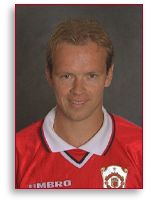
Birthplace:
Eidsvoll, Norway,
1/9/1969
Height:
183cm - 6ft 0in
Weight:
78kg - 12st 4lb
Full International:
Norway (61 caps, 6 goals)
Position:
Defender
Squad Number:
21
Debut:
13.08.1997
Appearances (1997-1999):
65 - 13 as sub
Goals:
2
Henning Berg was the shock signing of the 1997-98
season. With much speculation over whom Alex Ferguson
would and could sign hitting the headlines throughout the
close season, Berg's name had hardly been mentioned.
However, someone with an eye for detail and who had
closely followed Alex Ferguson's career would have known
that he had long been an admirer of Berg.
In fact Alex Ferguson had made his first enquiry about the
Norwegian defender nine years earlier. In 1988 Berg spent
a week at Old Trafford on trial. In the event it wasn't to be.
Berg claims: "I came here for a week in 1988. To be fair, I
wasn't good enough to play here then and I didn't get a
work permit anyway." Three further attempts and £5 million
later, Alex Ferguson and United finally got their man.
Signed from Blackburn Rovers, where he made 159 League
appearances and scored four goals, Berg was a member of
the Rovers team which pipped United on the final day of the
season for the Premier League Championship in 1995.
Berg's debut for Manchester United came two days after
signing, as a substitute for the injured Ronny Johnsen, in a
home match against Southampton. Berg admits that he did
not expect to find himself in the side so soon after signing.
However, Berg settled into the side quickly and played an
important role in United's defence alongside either Gary
Pallister or Ronny Johnsen.
Berg is an experienced international with over 50
appearances to his name, and played in the 1994 and 1998
World Cups. Berg is a cool and professional defender who
has good aerial ability, which led to him scoring a couple of
goals for United in the 1997-98 season.
United's successful 1998/99 European Cup campaign owed
much to Berg, who made vital goalline clearances against
Inter Milan to help the Reds progress. Unfortunately an
injury ruled him out for much of the season run-in, meaning
he missed out on much of the glory he had worked so hard
to gain for the Reds.
Did You Know?
Henning Berg was a Manchester United supporter as a
child.
In 1995 he was voted Norwegian Player of the Year and
became the first player from Norway to win an English
League Championship medal.
Henning Berg was once sent off playing for Blackburn
Rovers in a match against Manchester United in the
1994-95 season. However, Berg claims it was an injustice:
“I just couldn’t believe it. It was a bad mistake by the
referee, but then everybody makes mistakes. That’s the
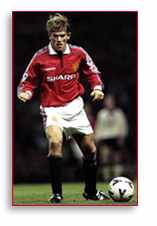
Birthplace:
Tavelsjo, Sweden,
5/2/74
Height:
176cm - 5ft
9in
Weight:
71kg - 11st
3lb
Full International:
Sweden (29 caps,
0 goals)
Position:
Left Winger
Squad Number:
15
Debut:
09.09.1998
Appearances (1998-1999):
38 - 9 as sub
Goals:
1
Jesper Blomqvist first grabbed all the headlines in
Manchester when he single-handedly humiliated United on
a cold December evening in Gothenburg in 1994. On the
night, United were well beaten 3-1 by the Swedish side and
their hopes of qualifying for the latter stages of the UEFA
Champions League were all but gone. It was a night
United's players and fans chose to forget. However, in true
Matt Busby fashion (Busby signed Johnny Berry because
he claimed "every time we played Birmingham City he led
us a merry dance!"), Alex Ferguson did not forget the
young Swede's performance and tried to sign him. Almost
four years later, and after four unsuccessful bids, he finally
arrived at Old Trafford.
Jesper began his professional footballing career with
Swedish first division club Umea. In 1993 he was voted the
best young Swedish player, and in autumn of the same
year he moved to IFK Gothenburg where he enjoyed a
considerable amount of success, winning the League
Championship in his first season and reaching the
quarter-finals of the European Cup in the following season.
His performances attracted the attention of many of
Europe's leading clubs including Manchester United. In the
end, Gothenburg chose to sell their star player to Italian
giants AC Milan.
At Milan, Blomqvist experienced mixed fortunes, claiming:
"It was hard for me at Milan. The team were not playing so
well and it was difficult for the new players to settle down."
Milan finally sold Blomqvist to Parma where his game and
all round play improved. "Parma helped me become a
better defensive player as well as playing as an attacking
winger." Although happy at Parma, a change of coach and
the chance of playing in the English Premier League
prompted Blomqvist to consider a change of surroundings
and join United. At the press conference to confirm his
£4.4 million signing the Swedish star said, "I think I am
going to enjoy it in English Premier League. The football
here is more fun than in Italy."
After a foot injury ruled him out of the first month of the
season, Blomqvist made his debut against Charlton
Athletic in a convincing 4-1 victory. However his good
display went somewhat unnoticed, due to the off-field
activities at board room level capturing all the news
headlines. He has since been a regular member of the
squad and he scored his first League goal for United on
31st October 1998 in a 4-1 victory over Everton at
Goodison Park. He made 38 appearances in the club's
record breaking treble-winning season - a very satisfactory
start.
Blomqvist is a Swedish international who was included in
the squad for the 1994 World Cup in the USA. His pace,
skill and eye for goal have drawn comparisons to United's
own Ryan Giggs. Nevertheless, Blomqvist is quick to
stress that although Giggs has influenced him, he is a
player in his own right. "Ryan Giggs was one of my
inspirations when I was a young player, but now I think I
must find my own inspiration."
Jesper scored United's first goal on their pre-season tour of
Australia and the Far East, prior to the 1999/2000
campaign.
Did You Know?
Jesper was voted Sweden's Player of the Year in 1993.
When he was a youngster, football did not feature in
Jesper's career ambitions. Apparently he wanted to be an
airline steward!
Jesper's girlfriend is also a talented footballer, who played
in the 1999 Women's World Cup for Sweden.
Birthplace:
Fairfield, Sydney, Australia, 13/1/1972
Height:
188cm - 6ft 2in
Weight:
85.73kg - 13st 7lb
Full International:
Australia (13 caps, 1 goal)
Position:
Goalkeeper
Squad Number:
1
Debut:
30.04.1990
Appearances (1990-1991):
3
Goals:
0
Mark Bosnich was born of Croatian parents in Australia,
and joined United as a non-contract player.
He was a student at Manchester Polytechnic when he
made his first senior appearance, as deputy for Jim
Leighton, against Wimbledon towards the close of season
1989-90. The eighteen year-old goalkeeper's assured
display was the one bright feature in a goalless match.
After two seasons at Old Trafford, his failure to gain a work
permit led him to return home to Australia, where he linked
up again with Croatia Sydney. Bosnich's subsequent
marriage to a Manchester girl ensured his eligibility to work
in the United Kingdom, and in February 1992 he joined
Aston Villa, after borrowing money from his family to buy
out his contract with Croatia Sydney.
His move to Aston Villa saw him team up again with Villa's
ex-United coach, Brian Whitehouse, whose
recommendation led to Bosnich joining the Villa Park staff.
The Old Trafford faithful were to witness a remarkable
display of goalkeeping by the young Australian in the vital
top-of-the-table clash between Villa and United in March
1993. He certainly proved to be an outstanding success
after taking over from Nigel Spink in Villa's goal.
Unfortunately, controversy over his transfer - free to Aston
Villa but with an alleged payment to an agent - broke FIFA
rules, and in May 1993 the FA brought a charge of
misconduct against Villa.
In season 1993-94 Bosnich further enhanced his growing
reputation. His remarkable record of saves from penalty
kicks helped Villa to reach Wembley where they won the
League Cup for the fourth time in their history, at United's
expense.
In 1995-96, Villa regained the trophy with a 3-0 win over
Leeds United in the final. Bosnich was again a key figure in
the success.
The Australian international goalkeeper re-joined
Manchester United at the end of season 1998-99, when his
contract with the Midlands club expired. There was no
transfer fee, as per the Bosman ruling.
Mark restarted his United career during the pre-season tour
of Australia and the Far East. Mark kept goal for the two
matches in his homeland, keeping clean sheets in both.
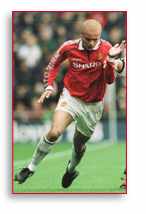
Birthplace:
Manchester,
13/10/79
Height:
185cm
- 6ft 1in
Weight:
74.83kg - 11st 11lb
Full International:
England (1 cap, 0 goals)
Position:
Defender
Squad Number:
24
Debut:
04.05.1998
Appearances (1998-1999):
23 - 6 as sub
Goals:
0
A former student at the FA School of Excellence at
Lilleshall, Wes Brown also played for Manchester and
Greater Manchester as a schoolboy. He signed as a
trainee on leaving school in July 1996 and signed as a
professional just four months later on 4 November 1996.
In his first full season at Old Trafford, Brown picked up a
Lancashire FA Youth Cup winners' medal and a Lancashire
League Division One medal together with the Denzil Haroun
Young Player of the Year award.
Performances throughout the season earned him a place
on the substitutes' bench against Leeds United on 4 May
1998. Brought on in the 60th minute to replace David May,
he appeared in the starting line-up for the first time the
following week as United defeated Barnsley 2-0.
His performances in the 1998-99 season again caught the
eye. An accomplished central defender, Brown gained a
regular first team place deputising for the injured Denis
Irwin at full-back. Quick and able to surge forward down the
wing, Brown has had football critics revelling in his
potential, likening him to a young Paul McGrath.
An established international at Under-18 and Under-21
level, Brown made the step up to the senior squad during
the 1998/99 season, and received his first cap under Kevin
Keegan, playing against Hungary in Budapest.
Wes' first team opportunities became rarer towards the end
of the season, but the young defender had played his part
in the club's treble success.
Did You Know?
When Wes travelled to Italy with United's Reserves in
1998, he acquired the autograph of AC Milan legend
Franco Baresi.
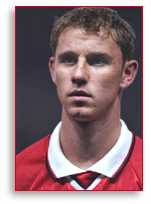
Birthplace:
Manchester, 21/1/1975
Height:
178cm - 5ft 10in
Weight:
72.11kg - 11st 5lb
Full International:
England (8 caps, 0 goals)
Position:
Midfield
Squad Number:
8
Debut:
21.11.1992
Appearances (1992-1999):
207 - 37 as sub
Goals:
16
After playing for Oldham and Greater Manchester
Schoolboys, Nicky Butt signed for Manchester United as a
trainee in July 1991 and turned professional in January
1993. He was a part of the successful FA Youth Cup side
in 1992, scoring twice in the first leg of the final against
Crystal Palace. He was a finalist again a year later, but
this time on the losing side.
His first team debut came on 21st November 1992, as a
65th minute substitute for Paul Ince against Oldham
Athletic. By the end of the 1994-95 season he had earned
himself a place in the starting line up for the FA Cup Final,
but he finished with a runners-up medal after losing 1-0 to
Everton.
Twelve months later Butt was to collect a winners' medal in
the 1996 FA Cup Final, completing a League and Cup
double for himself and Manchester United.
During the early part of the 1998/99 season, Nicky's
progress was hampered by two consecutive sendings-off
against Barcelona and Arsenal. The subsequent
suspensions forced him to miss important games and he
ended up virtually sharing the role of midfield partner to Roy
Keane with Paul Scholes, depending on the requirements
of particular matches. Ironically Scholes' suspension from
the Champions League Final in Barcelona guaranteed Butt
a place in the starting line-up. The honours gained this
season mean he has now won three Premiership medals,
two FA Cup winners medals and a Champions League
medal.
He has represented England at schoolboy, youth, Under-21
and full international level. He was also a member of the
England Under-18 squad that lifted the European
Championship in July 1993.
Did You Know?
On leaving Manchester United, for Middlesbrough, Bryan
Robson singled out Nicky Butt for future greatness.
Incidently Bryan Robson was his childhood hero.
Kevin Keegan said of Butt: “Nicky’s a tough little character.
I think he’s got a tremendous future at international level.”
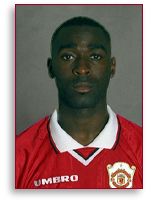
Birthplace:
Nottingham, 15/10/1971
Height:
178cm - 5ft 10in
Weight:
78kg - 12st 4lb
Full International:
England (5 caps, 0 goals)
Position:
Forward
Squad Number:
9
Debut:
22.01.1995
Appearances (1995-1999):
184 - 27 as sub
Goals:
81
Andy Cole began his footballing career with Arsenal, joining
them on schoolboy forms after playing at the National
School of Excellence at Lilleshall.
However, things did not go according to plan and his first
team outings with Arsenal were limited. After Cole was
loaned to Fulham and Bristol City, he was transferred to
Bristol City in July 1992, for a fee of £500,000.
He spent just a little under a year with Bristol City before
Newcastle paid £1,750,000 - a record transfer fee received
by Bristol City - in March 1993. He was an instant success
with Newcastle, helping them to secure promotion into the
Premier League in his first season. The following year, his
34 League goals won him the European 'Golden Boot' and
the 1994 PFA Young Player of the Year award.
In January 1995, in an attempt to strengthen his squad,
Alex Ferguson paid a then British record transfer fee of
£6,250,000 for Andy Cole's services.
In his first season with United he scored twelve goals in
seventeen games - a decent return for any forward - five of
them coming in Manchester United's 9-0 defeat of Ipswich
Town. His goals, however, were not enough to clinch the
Championship in the 1994-5 season and United finished
the season without any silverware for the first time in five
years.
The following season Cole picked up a Premier League
Championship medal, scoring one of United's goals in their
3-0 victory at Middlesbrough in the last game of the
season, to wipe out the memory of West Ham twelve
months earlier. He also collected an FA Cup winners'
medal as United completed the Double for the second time
by beating Liverpool 1-0 in the final.
The 1996-97 season did not all go according to plan for
United's record signing. Cole started the season with
pneumonia, then broke both legs in a Reserve team game
in September. On top of this, Alex Ferguson's summer
signing Ole Gunnar Solskjaer, had got off to a flying start
scoring five goals in his first ten games.
Fortunately for Cole, the season finished on a much
happier note, with United picking up their fourth League
Championship in five years, and his subsequent recall to
the England squad.
The 1997-98 campaign proved to be one of Cole's best
seasons. He finished as United's top scorer with 25 goals
including two hat-tricks, one against Barnsley in a 7-0
thrashing and one against Feyenoord in the UEFA
Champions League. Despite a season of much personal
success, Cole was unlucky not to be included in England's
22 man squad for the World Cup Finals in France.
The 1998-99 season saw Cole begin where he left off,
striking up an almost telepathic partnership with new
signing Dwight Yorke. Cole played some of the best
football of his career, and it was to the astonishment of
football managers and critics alike the length and breadth
of the country that Glenn Hoddle continued to overlook
Cole's dazzling form. Nevertheless, when Howard
Wilkinson temporarily took charge of the England team,
Cole was recalled to the squad, one which had apparently
been picked by Hoddle. New England manager Kevin
Keegan, Cole's old manager at Newcastle, continued to
select Cole.
Andy describes his partnership with Yorke thus: "It is the
kind of partnership I have been looking for and I haven't had
anything as good as this since I was playing with Peter
Beardsley at Newcastle. The fact that we get on so well off
the field has been the big thing for me. We have a laugh in
training and try to do the same thing on the pitch."
Did You Know?
Andy Cole played for England schoolboys, scoring on his
debut in a 2-0 victory over West Germany at Wembley.
He scored the equalising goal for Manchester United, in
their 2-1 victory against Southampton, in April 1995, the
same day his son Devante was born.
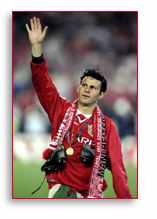
Birthplace:
Cardiff, 29/11/1973
Height:
180cm - 5ft 11in
Weight:
68.03kg - 10st 10lb
Full International:
Wales (24 caps, 5 goals)
Position:
Forward
Squad Number:
11
Debut:
26.02.1991
Appearances
(1991-1999):
354 - 31 as sub
Goals:
75
Ryan Giggs moved to England, from Wales, at the age of
seven. He joined Dean's Youth FC where he learned how to
play football. His coach at Dean's Youth was Denis
Schofield, who referred him to Manchester City, where he
played for their school of excellence until he was fourteen
years old.
On his fourteenth birthday Alex Ferguson went to Ryan
Giggs' home in Swinton, Manchester, to ask him to sign
schoolboy forms. Ken Barnes, City's chief scout, had
already confirmed they would not be signing him. Their loss
was Manchester United's gain, and the rest as they say is
history!
At 16, Ryan signed amateur forms (YTS) and turned
professional in November 1990, just after his 17th birthday.
His League debut for Manchester United came on 2nd
March 1991, against Everton at Old Trafford, as a
substitute for Denis Irwin. His first League start was in the
Manchester derby at Old Trafford at the end of the same
season, when he scored the only goal of the match.
Following an injury to Lee Sharpe at the start of the 1991-2
season, Giggs was able to gain a regular first team place,
making the left-wing position his own.
Whilst at Manchester United, Giggs has won every
domestic trophy, as follows: the League Cup in 1992,
League Championships in 1993, 1994, 1996 and 1997, two
FA Cup winners' medals in 1994 and 1996 and an FA Cup
runners-up medal in 1995.
In addition to this Giggs has represented Wales at full
international level, being the youngest ever player to play
for Wales at the age of 17 years and 321 days, when he
came on as a substitute against West Germany.
He has also recently captained Wales. As a schoolboy
Ryan captained the England Schoolboys team, but this
was only because he attended school in England and not
because he is English!
Ryan is one of the most talented players currently in the
game, a fast winger with an immense amount of skill and a
free kick expert. He has scored many memorable as well
as important goals for Manchester United.
During the last-ever FA Cup semi-final replay, Ryan
produced an unforgettable moment. Roy Keane had been
sent off for a second rash challenge. In injury time Peter
Schmeichel saved superbly from a Dennis Bergkamp
penalty and the game went into extra-time.
In the final minutes, with the game heading for a penalty
shoot-out, Giggs ran directly at the defence hailed as the
best in the game. He burst past four players before
unleashing a fierce shot into the roof of the net, giving David
Seaman no chance. Many critics proclaimed it the greatest
goal of all time.
This semi-final victory kept up the impetus for United's
relentless march to the Treble, to which Giggs contributed
immeasurably.
Did You Know?
His childhood heroes were Mark Hughes and Ian Rush.
His father, Danny Wilson was a Rugby League player for
Cardiff and Swinton. Giggs still takes an interest in Rugby
League and goes to watch Wigan RL, as often as possible.
Although Ryan is a Welsh international, he was once the
captain of the England Schools football team.
He is the only player ever to iwn the PFA Young Player of
the Year award twice - in 1992 and 1993.
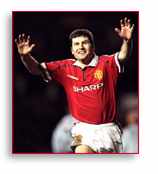
Birthplace:
Cork, 31/10/1965
Height:
173cm - 5ft 8in
Weight:
68.03kg - 10st 10lb
Full International:
Republic of Ireland (52 caps, 4 goals)
Position:
Full-back
Squad
Number:
3
Debut:
18.08.1990
Appearances
(1990-1999):
433 - 12 as sub
Goals:
27
Denis Irwin was born in Cork on October 31 1965. As a
sixteen-year-old he signed for Leeds United as an
apprentice. He made a total of 72 appearances for the
Yorkshire club before being released as a 20-year-old, on a
free transfer, to join Oldham Athletic. He helped the Latics
to the League Cup final and FA Cup semi-final against
United in 1990. His performances must have impressed
Alex Ferguson, who paid £625,000 for his services in the
summer of 1990.
In his first season at United, he was again on the losing
side in a League Cup final, but winning a European Cup
Winners' Cup medal more than compensated for this. 12
months later he was back at Wembley for yet another
League Cup final. This time United won, beating
Nottingham Forest. In the 1992/93 Championship winning
season, Irwin was an ever-present member of the team,
playing in 40 League games, scoring 5 goals (most notably
a 30-yard strike from outside the area against Coventry
City). He has since added four more Premiership titles, two
FA Cup winners' medals and a Champions League medal
to his collection.
With the departure of Brian McClair and Gary Pallister in
the 1998 close season, Denis is the longest serving
professional player in Alex Ferguson's current squad.
Towards the end of the 1998/99 season, Denis was harshly
sent off against Liverpool for kicking the ball away. This
meant that Denis was forced to miss the FA Cup final
against Newcastle, but kept him fresh for the Champions
League victory over Bayern Munich in Barcelona.
Denis is one of the greatest fullbacks in United's history.
The quiet irishman's consistency has made him a vital
player in United's team of the 90's. In the Reds' first
Double-winning season he was the only player to play in all
League and FA Cup games. Apart from being a vital
member of United's team, he is a regular member of the
Republic of Ireland squad and appeared in the 1994 World
Cup finals in America.
Did You Know?
Denis Irwin has been capped at all levels by Ireland: at
schoolboy, youth, under-21 and full.
His room mate at United is Roy Keane.
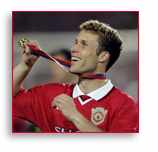
Birthplace:
Sandefjord, Norway, 10/6/1969
Height:
191cm - 6ft 3in
Weight:
83.45kg - 13st 2lb
Full International:
Norway (41 caps, 2 goals)
Position:
Defender/Midfield
Squad Number:
5
Debut:
17.08.1996
Appearances (1996-1999):
112 - 15 as sub
Goals:
7
Ronny Johnsen began his footballing career with Stokke,
before having spells with Eik Tonsberg, Lyn Oslo and
Lillestrom. After playing Norwegian football for most of his
career, Johnsen moved abroad to play in the Turkish
league for Besiktas.
A Norwegian international since August 1991, his displays
in Turkish football impressed the United manager Alex
Ferguson, who had made previous enquiries about the
Norwegian defender. He finally got his man, paying
Besiktas £1.5m in the 1996 close season.
Bought as a replacement for Steve Bruce who had gone to
Birmingham City during the summer on a free transfer, he
quickly adjusted to life in the English Premier League and
with injuries to Gary Pallister and Denis Irwin, Johnsen was
a permanent fixture in the side.
His League debut came on the first day of the season
away to Wimbledon as a substitute for the injured Nicky
Butt. By the end of the season he had made 36 (6)
appearances, which included nine Champions League
games.
He turned out to be one of the bargain buys of the season
for Manchester United, out-done only by his international
team mate Ole Gunnar Solskjaer. He is a skilful defender
who alongside Jaap Stam, David May, or his international
team mate Henning Berg, forms a competent defensive
partnership. His versatility has also been useful especially
due to the fact he can play centre-half, full-back or midfield,
a role he performed magnificently during Roy Keane's
absence in the 1997-98 season.
In May 1997 he was rewarded with a Premier League
Championship medal, surprisingly the first major honour of
his career.
Ronny played in all four of Norway's France '98 matches,
before being knocked out by Italy in the second round. His
performance against Brazil brought special praise. National
newspapers claimed, "Johnsen played the shirt off
Ronaldo. He never gave him a chance." The Brazilian
manager Mario Zagallo added, "Ronny was the King. He's
so quick."
With his fellow Norwegian, Henning Berg, ruled out by
injury for the latter part of the season, Ronny played a key
part in the team's glorious finale to the historic 1998/99
season.
Did You Know?
His first goal for the club was in the 1997 Charity Shield
against Chelsea.
Whilst playing for Besiktas a goat was brought onto the
pitch and slaughtered before a match. Ronny Johnsen
commented: “They brought out a goat, cut its head off and
smeared the blood all over my forehead." (FourFourTwo,
Sept. 1997)
After his performance against Brazil in the 1998 World
Cup, he was dubbed "The Miracle of Marseille" for marking
Ronaldo out of the game.
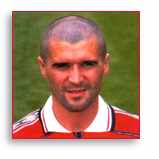
Birthplace:
Cork, 10/8/1971
Height:
180cm - 5ft 11in
Weight:
76kg - 12st 0lb
Full International:
Republic of Ireland (42 caps, 5 goals)
Position:
Midfield
Squad
Number:
16
Debut:
07.08.1993
Appearances
(1993-1999):
227 - 8 as sub
Goals:
26
After failing to get an apprenticeship with any English
League clubs, Roy Keane began his footballing career with
Cobh Ramblers before Brian Clough took him to
Nottingham Forest as an eighteen-year-old.
His League debut with Nottingham Forest was a real
baptism of fire, away to Liverpool, the then champions. At
the end of his first full season, Keane made an appearance
in the 1991 FA Cup Final, collecting a runners-up medal.
A season later he was again on the losing side at
Wembley, with Nottingham Forest losing 1-0 to
Manchester United in the League Cup Final.
His luck with Nottingham Forest ran out the following
season as they were relegated. In the 1993 close season
the race for Roy Keane's signature began, with United
emerging the victors. They paid a then club and English
record fee of £3.75 million.
Whilst he has been at Manchester United, Keane's ball
winning skills, drive, determination and late runs into the
box to score vital goals have made him an irreplaceable
figure in the team's midfield, so much so that he is often
compared to the legendary Bryan Robson. He has helped
United to win four Premier League Championships,
including three Doubles in 1994, 1996 and 1999.
At the end of the 1996-97 season, when Eric Cantona
retired from professional football, Keane took over the role
of team captain.
However, less than two months into the new season,
Keane injured his knee and spent a frustrating season on
the sidelines. Many pundits felt that towards the end of
1997-98 when United were faltering, it was his presence
and determination which the team sorely missed, and in
the end was a crucial factor in the Championship ending up
at Highbury. Fortunately for Manchester United, Keane
fought his way back to full fitness to lead the team out at
Wembley in the 1998 pre-season Charity Shield.
First capped by Jack Charlton in 1991, Roy has been an
important member of the Republic of Ireland squad. He
played for them in the 1994 World Cup Finals in the USA,
but was absent with injury when they failed to qualify for
the 1998 Finals in France. The Irish are now looking to
qualify for Euro 2000.
The 1998/99 season, which ended with United's glorious
treble, saw Roy Keane restored to full fitness. As we
reached the climax of this glorious season, Roy enjoyed
mixed fortunes. A sending-off in the FA Cup semi-final
replay was followed by a yellow card in the Champions
League semi-final second leg against Juventus, focing him
to miss the memorable final in Barcelona.
He recovered from an ankle injury to play in the last League
match versus Tottenham and collected the Premiership
trophy. The following week at Wembley, however, he
sustained another ankle injury and was forced to give way
to Teddy Sheringham in the early stages of the game,
knowing his season had ended there and then.
In Barcelona, despite Keane taking no active part in the
match, the fans finally got their way during the post-match
celebrations when they insisted on Roy taking his deserved
bow with the Champions League trophy in front of the
massed ranks.
Roy did not take part in the pre-season tour of Australia
and the Far East, not having recovered from the ankle
injury. His contract came into focus during the close
season, after he turned down the club's initial offer of a an
extension.
Did You Know?
As a youngster Roy wrote to English clubs for a trial, but
didn't write to United. He didn't think he was good enough.
Roy Keane cost Nottingham Forest a mere £10,000 from
Cobh Ramblers.
On the day before he was sent off for Ireland against
Russia, Keane said, ‘I think I’ve only been booked a couple
of times in the last dozen games, which is good for me. I
had better not say any more about that or I’ll probably be
sent off next week!’
He wore four different kits in his first five matches for
United: Blue (v Arsenal), Green and Gold (v Benfica),Black
(v Celtic), Red (v Arsenal). All were pre-season friendlies.
In 1992 he won the Zenith Data Systems Cup with
Nottingham Forest.
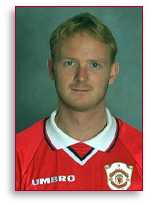
Birthplace:
Oldham, 24/6/1970
Height:
183cm - 6ft 0in
Weight:
85kg - 13st 5lb
Position:
Defender
Squad Number:
4
Debut:
14.08.1994
Appearances (1994-1999):
103 - 14 as sub
Goals:
7
David May was signed by Blackburn Rovers as a
schoolboy and progressed through the ranks of junior
football with the Lancashire side into the first team.
May was part of the Blackburn team which gained
promotion to the Premier League via the play-offs in
1991-92.
When May's contract was up in the summer of 1994, Alex
Ferguson moved in to sign him for £1.2 million - with a view
to him eventually replacing Steve Bruce. However, his first
season at Old Trafford did not go as planned. He was
played out of position for much of the season and the
Bruce-Pallister partnership at the back seemed to be as
strong as ever.
The following season May fought hard to win a regular
place in the centre of United's defence and by the end of
the season the centre-half position had become his. But it
was in the 1996/97 season when May showed just why
Alex Ferguson had bought him. He is a popular player
amongst the Manchester United supporters who chant his
name to the tune of 'Jesus Christ Superstar'. To round his
season off May was also selected by Glenn Hoddle to join
the England squad in March 1997 but he was forced to
withdraw because of an injury.
Since joining United May has won two League
Championship medals in 1996 and 1997 and an FA Cup
winners' medal in 1996. A frustrating run of injuries meant
that his 1998/99 season did not get underway until the
latter stages. This was at the time that Alex Ferguson was
looking to rest key players as the season approached its
amazing climax.
His reappearance came too late to earn him a Premiership
medal, although he had certainly played his part. He made
up for lost time, however, with another FA Cup winners'
medal and also a Champions League winners' medal.
Did You Know?
May's confession that as a child he supported Manchester
City did not initially endear him to the United faithful!
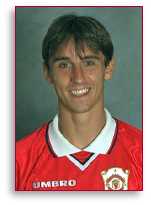
Birthplace:
Bury, 18/2/1975
Height:
178cm - 5ft 10in
Weight:
73.03kg - 11st 7lb
Full International:
England (32 caps, 0 goals)
Position:
Defender
Squad Number:
2
Debut:
16.09.1992
Appearances (1992-1999):
216 - 11 as sub
Goals:
2
After playing for both Bury and Greater Manchester
Schoolboys, Gary Neville joined Manchester United on
schoolboy forms in July 1991 and signed as a professional
eighteen months later in January 1993.
He was a part of the successful Youth team of 1992 and
1993 which produced several players for the senior squad.
He made his first senior appearance for Manchester United
in the UEFA Cup in September 1992 against Torpedo
Moscow.
It was in the 1994-95 season, when Neville became a
regular in United's first team, replacing the injured Paul
Parker at full-back. It was in the same season that he
appeared in the 1995 FA Cup Final, only to end up on the
losing team - a double disappointment considering
Manchester United missed out on winning the League
Championship on the last day of the season by one point.
However, the following season Neville collected a League
Championship medal and came on as substitute in the
1996 FA Cup Final. His joy was complete when he was
picked for England's Euro '96 squad, where he played in
every game apart from the semi-final when he was
suspended. Gary Neville added another League
Championship medal to his collection in 1997.
In the summer of 1998, Neville was included in Glenn
Hoddle's 22-man England squad for the World Cup in
France, playing in three of England's four matches.
Gary played a full part in the 1998/99 season, making 54
appearances throughout the Treble-winning campaign. He
even managed to score a goal against Everton, taking his
tally up to two in his United career!
Neville is a composed, tough tackling defender who is
comfortable at full-back or in the centre of defence and
looks set to be a fixture in both United's and England's
defences for some time to come.
Did You Know?
When Gary and Phil Neville played together for England in
the summer of 1996 it was the first time brothers had
played together in the England team since the Charltons in
the 1960’s.
Gary Neville was a member of the England Youth team
which won the European Under-18s Championship in 1993.
His father Neville Neville is the commercial manager at
Bury FC and his mother Jill is the secretary there.
His sister, Tracy, is an England international at netball.
Philip
Neville
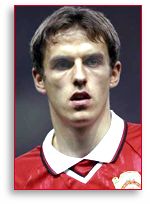
Birthplace:
Bury, 21/1/1977
Height:
180cm - 5ft 11in
Weight:
75kg - 11st 11lb
Full International:
England (17 caps, 0 goals)
Position:
Defender
Squad
Number:
12
Debut:
28.01.1995
Appearances
(1995-1999):
144 - 31 as sub
Goals:
2
After playing football for Bury Schools and Greater
Manchester Schoolboys, Phil Neville joined Manchester
United as a trainee on 5th July 1993. However, he could
have chosen a different career if he had not been signed by
Manchester United. He was regarded as an outstanding
talent at cricket and could well have reached county level.
Less than twelve months after he had signed as a trainee
he turned professional. His League debut was a real
baptism of fire, a Manchester derby at Maine Road in
February 1995.
Phil has gone on to make almost 150 senior appearances
for United, and played his part in the team's remarkable
achievements in the 1998/99 season. Denis Irwin's
suspension from the FA Cup final against Newcastle gave
Phil his opportunity at left back.
During his time at Old Trafford, Phil has won three League
Championship medals, two FA Cup medals and a
Champions League winners' medal, as well as captaining
the Youth team to the FA Youth Cup in 1995. His
performances have caught the eye of England's managers
and he has been a regular member of the international
squad, with the heartbreaking exception of Glenn Hoddle's
22-man party for France '98.
A classy defender, Phil's skills earned him a place in Alex
Ferguson's 'Team of the Decade' when he selected a
United side for a special video.
Did You Know?
Phil Neville is the youngest United player to win the League
and FA Cup Double.
Phil once played for England Under-15s at cricket and
football in the same week.
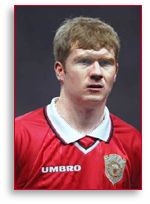
Birthplace:
Salford, 16/11/1974
Height:
170cm - 5ft 7in
Weight:
74kg - 11st 9lb
Full International:
England (17 caps, 7 goals)
Position:
Forward
Squad Number:
18
Debut:
21.09.1994
Appearances (1994-1999):
175 - 51 as sub
Goals:
49
Paul Scholes signed for United on trainee forms on 8th July
1991 and turned professional eighteen months later on 23rd
July 1993. Scholes showed much promise in the Youth
and Reserve teams, winning an FA Youth Cup winners'
medal in 1992 and a runners-up medal in the same
competition a year later. He was also a member of the
England Under-18 team which won the European
Championships in 1993.
His League debut was against Ipswich Town on 24th
September 1994, where he scored twice in a 2-3 defeat.
In the 1994-95 season Paul Scholes became a regular
player, in the absence of Eric Cantona (through
suspension) and Mark Hughes (through injury), earning
himself a place in the FA Cup Final as a substitute for Lee
Sharpe.
However Scholes and Manchester United ended the
season with no silverware for the first time in five years. The
following season had a much happier ending, as United
pipped Newcastle United to win their third Premier League
title in four years, with Scholes picking up his first major
honour. To cap the season off he was in the starting line-up
for the FA Cup final victory against Liverpool to complete a
historic 'Double Double'.
Paul has become an important member of the Manchester
United team and his goals have often come at important
stages of the season.
A full international, Scholes scored on his full international
debut and his first international at Wembley. Paul played
his part in the 1998 World Cup Finals, scoring in England's
opening match against Tunisia, and starting all four of their
games in the competition.
In March 1999, Paul became the first player since Norman
Whiteside in 1984 to score a competitive goal for
Manchester United on Italian soil. He scored the Reds'
equaliser in a 1-1 Champions League draw with Inter Milan
at the San Siro Stadium.
March proved to be a dramatic month for Paul. Following
his heroics in Milan, he went on to net all of England's
goals at Wembley in a 3-1 win over Poland in a qualifying
match for Euro 2000.
Though generally shy of the media, he did admit on
television to being very proud of this feat, saying: "That was
the best feeling I've had in football. I have scored some
important goals for United in the Champions League, but
that was something else. To come off with that matchball
under my arm and have all the fans cheering for me felt
great."
Days later, Paul announced that he and his new wife Claire
were expecting their first baby, but still the fairytale didn't
end there. He played a big part in winning the Treble,
scoring the Reds' second goal in the FA Cup Final against
Newcastle United.
The only sour notes of Scholes' 1998/99 season were the
suspension which forced him to miss the Champions
League Final in Barcelona, and the ignominy of being the
first England player ever to be sent off at Wembley. That
occurred in the Euro 2000 qualifier against Sweden which
ended in a disappointing 0-0 draw.
Did You Know?
In 1993 Paul Scholes won Manchester United’s Young
Player of the Year Award.
Paul Scholes supported Oldham Athletic as a youngster.
On his full international debut against Italy Paul Scholes
was voted man of the match and scored in a 2-0 victory
over Italy.
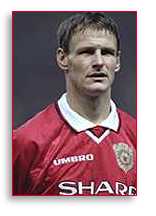
Birthplace:
Highams Park, 2/4/1966
Height:
185cm - 6ft 1in
Weight:
80kg - 12st 8lb
Full International:
England (38 caps, 9 goals)
Position:
Forward
Squad Number:
10
Debut:
03.08.1997
Appearances (1997-1999):
69 - 20 as sub
Goals:
19
Teddy Sheringham was bought by Manchester United in
the summer of 1997 for £3.5 million from Tottenham
Hotspur.
Sheringham is an experienced international player who
began his career with Millwall as an apprentice. Following
loan spells at Aldershot and Djurgaarden in Sweden, and
after playing 220 league appearances for Millwall, scoring
93 goals, he was bought by Nottingham Forest in 1991,
where he came to prominence.
Whilst at Forest he played in the same team as United's
captain Roy Keane. At the end of his first full season at the
City Ground, Sheringham was sold to Tottenham Hotspur
for £2.1 million. At Spurs he made 166 League
appearances and scored 76 League goals.
However, concerned that at the age of 31 he had yet to win
a major trophy, he asked for a transfer in the summer of
1997.
United had initially enquired about Sheringham before
buying Andy Cole back in 1995 and again at the end of the
1996/97 season, but were scared off by the £6 million
transfer fee. Nevertheless, his desire to leave Tottenham
prompted Spurs chairman, Alan Sugar to reduce his price
tag to £3.5 million.
He was quickly snapped up by the United manager. He
made his League debut for Manchester United, ironically at
White Hart Lane, against his old club Spurs. A week earlier
Sheringham had won his first medal with Manchester
United: the pre-season Charity Shield.
Towards the end of Teddy's first season with the Reds, his
old North London rivals from Arsenal put together a
stunning late run to win the League Championship. The
Gunners' fans gleefully taunted Teddy after this, pointing
out his lack of major honours whenever they could.
Twelve months later, after a thrilling climax to 1998/99, the
United man was able to silence the taunts once and for all.
He collected three medals after playing a crucial part in
some of the biggest games. It was ironic that Teddy should
make the difference, after spending most of the season
sidelined by injury or the impressive form of the Cole-Yorke
partnership.
It was widely acknowledged that Teddy changed the game
when coming on as a late substitute in the Champions
League semi-final home leg against Juventus. He was also
an early replacement for Roy Keane in the FA Cup Final
and scored within 96 seconds of his arrival on the pitch. He
then created the second goal for Paul Scholes and
deservedly claimed the Man of the Match award.
More glory followed in the Champions League Final in
Barcelona. 1-0 down to Bayern Munich, all had looked lost
for United until Alex Ferguson brought on the ex-Spurs
striker. He immediately started to trouble the German
defence and right on the 90th minute he tucked away the
crucial equalising goal.
Three minutes later, deep into injury time, Teddy nodded a
David Beckham corner into Ole Solskjaer's path. The
Norwegian did the rest, ending a 31-year wait for United to
win the European Cup for a second time.
A full international, Sheringham played an important part in
England's success in Euro 96. He was also a member of
the England World Cup squad in 1998, playing two games
before being replaced by Michael Owen. A superb end to
the domestic season with United in 1998/99 then earned
him a recall to the squad bidding to qualify for Euro 2000.
Did You Know?
Before joining Manchester United, Teddy Sheringham’s
memories of playing at Old Trafford were not too good. In
1993, after a Bryan Robson tackle, he was injured and did
not play for five and a half months. When playing for
Millwall he scored at Old Trafford - his team’s only goal in a
5-1 thrashing.
Prior to the remarkable success of May 1999, Teddy's only
medals were the Second Division Championship medal he
won with Millwall and the Zenith Data Systems Cup with
Nottingham Forest.
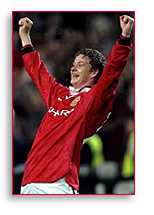
Birthplace:
Kristiansund, Norway, 26/2/1973
Height:
174cm - 5ft 9in
Weight:
74kg - 11st 9lb
Full International:
Norway (21 caps, 10 goals)
Position:
Forward
Squad Number:
20
Debut:
25.08.1996
Appearances (1996-1999):
111 - 41 as sub
Goals:
45
After playing part time Third Division football in Norway for
Clausenegen FK, Ole Gunnar Solskjaer moved to Premier
League Molde in 1995. His performances earned him a
place in the national team, and it was not long before he
started to attract the interest of bigger clubs throughout
Europe. He was also dubbed the Norwegian Alan Shearer.
In the summer of 1996 Alex Ferguson paid a £1.5m fee for
Solskjaer's services. Not expecting to be playing for United
until the new year, Solskjaer found himself almost a
permanent fixture in the first team, scoring on his first team
debut, and ending the season as top scorer with 19 goals,
18 of them in the League. A firm favourite with the United
faithful, his performances during this season prompted his
old manager at Molde to claim that if he had known he was
going to be this successful he would have asked United for
more money!
A full international for Norway, he won a League
Championship medal in his first season and helped United
to the semi-final of the European Cup, finding the net in the
second leg of the Borussia Dortmund game, only to find his
goal ruled out when the referee spotted a 'mystery' foul. In
addition to this he was also recognised by his fellow
professionals, being short listed for the 1997 PFA Young
Player of the Year Award.
Ole represented Norway at the 1998 World Cup finals,
playing three matches as the Vikings reached the second
round, only to be knocked out by Italy.
At the start of the 1998/99 season it was rumoured that
Solskjaer would be on his way out of Old Trafford after the
£12 million signing of Dwight Yorke. It is to Solskjaer's
credit and the supporters' relief that he decided to stay with
United and fight for his place. Although he was mainly
limited to substitute appearances, he could not be kept out
of the headlines during the Treble-winning season.
Grabbing a dramatic winner against Liverpool in the fourth
round of the FA Cup, Solskjaer rightly claimed the glory
and the limelight, with the newspapers calling him United's
super sub!
Two weeks later Solskjaer rewrote the record books, again
after coming on as a sub against Nottingham Forest at the
City Ground. He scored four times in an emphatic 8-1
victory, to create a new Premiership record for an away
win. His personal feast of four goals scored in thirteen
minutes had historians, statisticians and supporters alike
pondering as to whether this had been done before. No one
has yet come up with any answers, so we assume that
Ole Gunnar has indeed created a new football record.
Despite this feat, Solskjaer's starting opportunities
continued to be scarce. He did make the first eleven for the
FA Cup Final victory over Newcastle United but then
returned to the bench for the Champions League Final
against Bayern Munich.
There was a sense of deja vu about the sensational end to
this game. Once again Ole Gunnar was called from the
bench and produced a last gasp winner. The United
supporters attending the Final in Barcelona promptly struck
up a new song of "Who put the ball in the Germans' net?"
Did You Know?
He won the Norwegian Player of the Year Award in the
1995-96 season.
He scored on his debut for Manchester United, the 87th
player to do so.
He is known as the ‘baby faced assassin’, because of his
youthful looks. A nickname he personally dislikes!
He played 19 games and score 13 goals for the Norwegian
under-21 team.
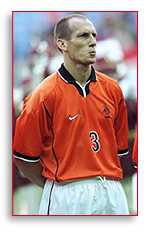
Birthplace:
Kampen, Holland 17/7/72
Height:
190cm - 6ft 3in
Weight:
86kg - 13st 8lb
Full International:
Holland (25 caps, 2 goals)
Position:
Defender
Squad Number:
6
Debut:
09.08.1998
Appearances (1998-1999):
52 - 1 as sub
Goals:
1
In 1994, Jaap Stam was turning out for little known Dutch
club Cambuur Leeuwarden. A move that year to top division
side Willem II was the turning point of his career, as
several top-level performances for them attracted the
attention of Holland's biggest clubs.
In 1996, PSV Eindhoven came in for Stam, and he won his
first international cap in the same year. His debut, against
Brazil, ended in a 2-2 draw, and he has been a fixture in
the Holland team ever since.
Europe's top clubs began to take notice of Stam, and in
1998, Manchester United paid a world record fee for a
defender, £10.6 million, to bring him to Old Trafford. This
dream move for Jaap - he idolised United as a child -came
just three months after he was named Holland's Footballer
of the Year.
The year got even better during the summer, as he reached
the semi-finals of the World Cup with Holland, falling to
Brazil.
Strong in the air and good on the ball, Stam can rightly
claim to be one of the best defenders in the world. Once
he'd settled in at United, many of his performances earned
him rave reviews.
In January 1999, he picked up Sky TV's Man of the Match
award for the FA Cup game against Middlesbrough and
scored his first goal for the club in a 6-2 drubbing of
Leicester City at Filbert Street.
An achilles tendon injury later threatened to ruin the Treble
run-in for Stam and United, and he was only fit enough for a
substitute's role in the FA Cup Final. However, he was
back in his usual place as the kingpin of the defence for
the Champions League triumph over Bayern Munich.
There is no doubt that United followers have taken him to
their hearts, proved by the rousing renditions in the Nou
Camp stadium of "Jip Jaap Stam is a big Dutchman......"
Any doubters from the start of his United career -
particularly among the media - should now count his
medals.
Did You Know?
One of the United fans' songs about Jaap Stam takes its
tune from the theme to the Batman television series.
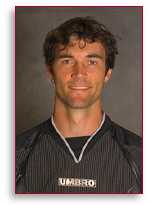
Birthplace:
Oldenzaal, Holland 24/3/63
Height:
190cm - 6ft 3in
Weight:
84kg - 13st 3lb
Position:
Goalkeeper
Squad Number:
17
Debut:
21.09.1996
Appearances
(1996-1999):
21 - 3 as sub
Goals:
0
Softly-spoken Raimond joined United from Vitesse Arnhem
in June 1996 as goalkeeping cover for Peter Schmeichel.
Having previously played more than 350 games in Holland,
Rai was an experienced choice for the understudy's
position following Tony Coton's departure to Sunderland.
Rai's United debut came against Aston Villa in September
1996, when he kept a clean sheet. His most notable
appearance came later that season against Borussia
Dortmund in the semi-final of the UEFA Champions
League, when Schmeichel pulled out with an injury just
minutes before kick-off. United lost the match 1-0, but Rai
played well and helped to keep the score down.
In 1998, he again played in a crucial Champions League
match for United, the second leg of the quarter-final against
Monaco. The Reds drew 1-1 but were knocked out on away
goals.
Ever the teacher, Rai coached United's young goalkeepers
for a while but in 1998/99 he relinquished this role when
Tony Coton rejoined the club as goalkeeping coach.
Rai then concentrated on his own playing career, but still
found himself playing second fiddle to Peter Schmeichel
whom he believes to be "the best goalkeeper in the world."
When Schmeichel announced he was to retire, it seemed
the big Dutchman might get a chance as United's number
one. Instead United snapped up Mark Bosnich on a free
transfer, leaving Rai on the subs' bench once again.
Still, there aren't many substitute goalkeepers who can
rival Rai's medal collection. In May 1999 he collected
winners' medals at both the FA Cup and Champions
League Finals, just for being there!
Did You Know?
Raimond used to sport a pony-tail, but he cut it off before
coming to England after hearing of Alex Ferguson's
disciplinarian reputation.
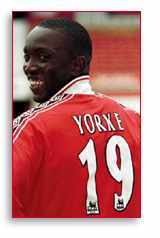
Birthplace:
Canaan, Tobago, 3/11/1971
Height:
175cm - 5ft 9in
Weight:
79.4kg - 12st 7lb
Full International:
Trinidad and Tobago
Position:
Forward
Squad Number:
19
Debut:
22.08.1998
Appearances (1998-1999):
52 - 3 as sub
Goals:
29
Dwight Yorke became Manchester United's record signing
in August 1998 when he was transferred from Aston Villa
for a fee of £12.6 million. This represented a very
handsome profit for Villa, who had signed him for just
£120,000 in 1989.
Former England manager Graham Taylor should take some
credit for unearthing Yorke's raw talent. In his role as Villa
boss, Taylor spotted him while on a pre-season tour of the
West Indies.
Dwight eventually made his full League debut for Villa under
a different manager, Dr Jozef Venglos. Ironically the
opposition were Manchester United and the match, played
at Old Trafford on 29 December 1990, ended in a 1-1 draw
with one goal apiece from United's Bruce and Pallister
(o.g.)
Big Ron Atkinson's three-year reign at Villa Park saw
Dwight flitting in and out of the side, hampered by injuries
and competition from Dean Saunders and Dalian Atkinson.
To Dwight's disappointment, he was left out of the side for
the 1994 Coca Cola Cup Final, when Villa wrecked
Manchester United's treble dream with a 3-1 victory.
The Trinidad and Tobago international enjoyed better times
under Brian Little, scoring the third goal in the 1996 Coca
Cola Cup Final win over Leeds United. In the following
campaign, 1996/97, he became the first Villa player since
1981 to net 20 League goals in one season.
In his last full season with Villa, 1997/98, Dwight helped
them to clinch a place in the UEFA Cup. The club's top
scorer with sixteen in all competitions, he found the net in
the final fixture, a crucial 1-0 win over champions Arsenal.
In his first season with United, Yorke played an
instrumental part in the club's Treble success. He was their
top goalscorer for the season with 29, and he set up many
others for Andy Cole, his new strike partner and close
friend.
Yorke's best performances were arguably in the FA Cup
and Champions League quarter-finals, in which he scored
twice against Chelsea and Inter Milan respectively.
At the end of the season, he was named as the Carling
Player of the Year. A Carling spokesman said of Yorke at
the time, "The value of his signing, in the light of today's
expensive market, has been proved beyond doubt."
Did You Know?
Dwight is a good friend of legendary West Indies cricketer
Brian Lara. On the day Dwight signed for United, Lara was
in typical form, scoring 158 runs for Warwickshire.
Former United boss Tommy Docherty slated Dwight after
witnessing his debut in 1990. The Doc, now a radio pundit,
said, "If that lad makes a First Division footballer, my name
is Mao Tse-Tung."